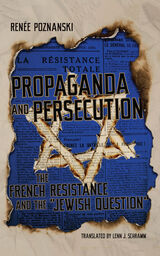5 books about Dziewanska, Marta
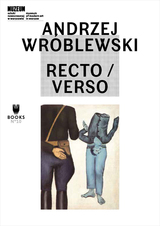
Andrzej Wróblewski
Recto / Verso
Edited by Eric de Chassey and Marta Dziewanska
Museum of Modern Art in Warsaw, 2014
One of Poland’s most important and independent postwar artists, Andrzej Wróblewski (1927–57) in his short life created his own highly individual, suggestive, and prolific form of abstract and figurative painting that continues to inspire artists today. This volume offers a stunning presentation and thorough re-evaluation of his work and its legacy in the international context of art history. Offering an insightful picture of the world of postwar painting in communist Europe, and highlighting Wróblewski’s political engagement, the book helps us to understand the immensely evocative vision of war and oppression that he created. This close look at a painter and a period that are of growing interest for international art historians will serve to further cement Wróblewski in the postwar pantheon.
[more]
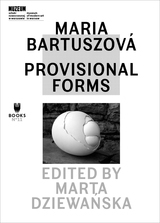
Maria Bartuszová
Provisional Forms
Edited by Marta Dziewanska
Museum of Modern Art in Warsaw, 2015
The work of Slovak sculptor Maria Bartuszová (1936–96) was first presented to international audiences in Kassel in 2007. Although her art has appeared in influential exhibitions and been included in prestigious contemporary art collections, up until now, she has yet to receive the widespread recognition she deserves. Dziewanska’s book offers distinct perspectives on Bartuszová’s work from renowned international critics in an effort to increase our awareness of her sculptures.
Working alone behind the Iron Curtain, Bartuszová was one of a number of female artists who not only experimented formally and embarked intuitively on new themes, but who, because they were at odds with mainstream modernist trends, remained in isolation or in a marginalized position. Revealing her dynamic treatment of plaster—a material that, from a sculptor’s point of view, is both primitive and common—the book deftly reveals how Bartuszová experimented with materials, never hesitating to treat tradition, accepted norms, and trusted techniques as simply transitory and provisional. Offering a much-needed history of a vibrant body of work, Maria Bartuszová: Provisional Forms is an important contribution to the literature on great female artists.
Working alone behind the Iron Curtain, Bartuszová was one of a number of female artists who not only experimented formally and embarked intuitively on new themes, but who, because they were at odds with mainstream modernist trends, remained in isolation or in a marginalized position. Revealing her dynamic treatment of plaster—a material that, from a sculptor’s point of view, is both primitive and common—the book deftly reveals how Bartuszová experimented with materials, never hesitating to treat tradition, accepted norms, and trusted techniques as simply transitory and provisional. Offering a much-needed history of a vibrant body of work, Maria Bartuszová: Provisional Forms is an important contribution to the literature on great female artists.
[more]
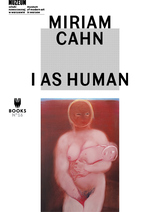
MIRIAM CAHN
I AS HUMAN
Marta Dziewanska et al.
Museum of Modern Art in Warsaw, 2019
A rebel and feminist, the Switzerland-born Miriam Cahn is one of the major artists of her generation. Widely known for her drawings and paintings, she also experiments with photography, moving images, sculptures, and performance art. Cahn’s diverse body of work is disturbing and dreamlike, filled with striking human figures pulsing with an energy both passionate and violent. These pieces, along with Cahn’s reflections on artistic expression, have always responded to her contemporary moment. In the 1980s, her work addressed the feminist, peace, and environmental movements, while the work she produced in the 1990s and early 2000s contains allusions to the war in the former Yugoslavia, the conflict in the Middle East, and the September 11 terrorist attacks. Her recent production tackles ever-evolving political conflicts, engaging with the European refugee crisis and the “#metoo” movement.
Miriam Cahn: I as Human examines different facets of the artist’s prolific and troubling oeuvre, featuring contributions from art historians, critics, and philosophers including Kathleen Bühler, Paul B. Preciado, Elisabeth Lebovici, Adam Szymczyk, Natalia Sielewicz and .
Miriam Cahn: I as Human examines different facets of the artist’s prolific and troubling oeuvre, featuring contributions from art historians, critics, and philosophers including Kathleen Bühler, Paul B. Preciado, Elisabeth Lebovici, Adam Szymczyk, Natalia Sielewicz and .
[more]
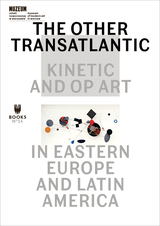
The Other Transatlantic
Kinetic and Op Art in Eastern Europe and Latin America
Edited by Marta Dziewanska, Dieter Roelstraete, and Abigail Winograd
Museum of Modern Art in Warsaw, 2017
The Other Transatlantic is attuned to the brief but historically significant moment in the postwar period between 1950 and 1970 when the trajectories of the Eastern European art scenes on the one hand, and their Latin American counterparts on the other, converged in a shared enthusiasm for kinetic and op art.
As the axis connecting the established power centers of Paris, London, and New York became increasingly dominated by monolithic trends including pop, minimalism, and conceptualism—another web of ideas was being spun linking the hubs of Warsaw, Budapest, Zagreb, Buenos Aires, Caracas, and Sao Paulo. These artistic practices were dedicated to what appeared to be an entirely different set of aesthetic concerns: philosophies of art and culture dominated by notions of progress and science, the machine and engineering, construction and perception. This book presents a highly illustrated introduction to this significant transnational phenomenon in the visual arts.
As the axis connecting the established power centers of Paris, London, and New York became increasingly dominated by monolithic trends including pop, minimalism, and conceptualism—another web of ideas was being spun linking the hubs of Warsaw, Budapest, Zagreb, Buenos Aires, Caracas, and Sao Paulo. These artistic practices were dedicated to what appeared to be an entirely different set of aesthetic concerns: philosophies of art and culture dominated by notions of progress and science, the machine and engineering, construction and perception. This book presents a highly illustrated introduction to this significant transnational phenomenon in the visual arts.
[more]

Post-Post-Soviet?
Art, Politics and Society in Russia at the Turn of the Decade
Edited by Marta Dziewanska, Ekaterina Degot, and Ilya Budratskis
Museum of Modern Art in Warsaw, 2013
By placing emerging artists in their political and social contexts, this collection attempts to confront the new activist scene that has arisen in the Russian art world during the past years. The recent explosion of protests in Russia—often with their very purpose being to decry the lack of artistic freedom—is a symptom of a fundamental change in culture heralded by Vladimir Putin’s first election. This shift was precipitated by the change to a highly commercial, isolated world, financed and informed by oligarchs. In response, the Russian contemporary art scene has faced shrinking freedom yet an even more urgent need for expression. While much of what is emerging from the Moscow art scene is too new to be completely understood, the editors of this volume seek to bring to light the important work of Russian artists today and to explicate the political environment that has given rise to such work. Post-Post-Soviet? will feature both criticism by writers and scholars, as well as dialogues with artists. Contributors include Boris Kagarlitsky, Ekaterina Degot, Keti Chukhrov, Boris Buden, Artur Zmijewski, and others.
[more]
READERS
Browse our collection.
PUBLISHERS
See BiblioVault's publisher services.
STUDENT SERVICES
Files for college accessibility offices.
UChicago Accessibility Resources
home | accessibility | search | about | contact us
BiblioVault ® 2001 - 2024
The University of Chicago Press



